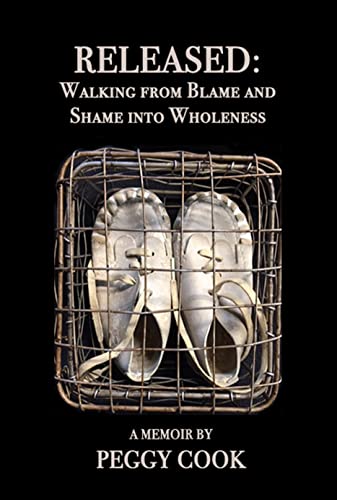
New Memoir, Exposes Childhood Medical Neglect and Finding One’s Agency After Leaving Christian Science
New memoirs of former Christian Scientists are seldom published. There are a few, Blue Windows and Fathermothergod, and now we can add to the list Peggy Cook’s excellent new memoir, Released: Walking from Blame and Shame into Wholeness. This exceptional memoir clearly articulates many of the challenges of growing up in Christian Science.
Peggy Cook was diagnosed with clubfeet upon her birth. This condition requires many surgeries and procedures during the formative years of a child for the condition to be fully corrected. Born into a strict Christian Science family, Peggy’s father was employed at the Mother Church in Boston and clung closely to orthodox Christian Science views—that prayer and medicine cannot be mixed. After undergoing several castings as a very young girl, Peggy’s parents decided not to continue medical treatment and to fully rely on prayer.
Childhood Trauma and Medical Neglect
In the introduction of Released, Peggy writes, as she looked for her baby book and found only empty pages: “I needed proof that I was celebrated despite my clubfeet. Proof of being a cherished infant, not just a burden and someone to constantly pray about. My birth, a joyful event.” (2021, Cook, p. 2)
Peggy then begins her story with her earliest of memories: being terrified as her parents took her to get her legs casted, a very traumatic event for a toddler to say the least. She recalls singing hymns with her parents, although even at an early age she did not find comfort in them at times of intense difficulty. Written in present tense, we are right there with Peggy as she endures the castings, the fear, and the interactions with her parents, who mean well, but do not grasp the trauma inflicted on their young daughter. She articulates how much later as an adult she began to understand why she struggled so much of her childhood—from these early traumatic childhood experiences.
Different View of Reality in Christian Science
In Released, Peggy gracefully weaves the Christian Science worldview into dialogue as she shares her childhood memories. Christian Scientists believe that the material world is not real, it’s just an illusion. Matter, like our bodies and the world around us, is artificial and not the true reality. Scientists spend copious amounts of time studying the writings of Mary Baker Eddy, the religion’s founder, and denying the existence of the material world around them. They deny the five senses and cling to a theology that only good exists and that everything is God; anything not good is not of God and therefore isn’t real. In Peggy’s case, her reality as a very young girl afraid of having her legs painfully cast and walking incorrectly was met with spiritual gaslighting by her parents.
“I say, ‘I’m scared.’ My father says, ‘That’s error telling you that you’re scared. That’s not you talking.’ (2021, Cook, p. 13).
In her child’s mind, the only state of mind that made sense, Peggy internalized fear and pain that impacted her entire childhood and into adulthood. The way that she is able to articulate this disparity in her childhood sense of reality as an adult looking in on herself not only gives weight to the traumatic childhood experience she alone faced, it gives voice to many others who have never written about their pain. This is the power of memoir.
Embarrassed by the Failure of Christian Science Prayer
A byproduct of any high control religious group is extreme guilt, embarrassment, and shame. The group makes the rules, often rules including extreme requirements such as no medical treatment, ignoring a situation that needs professional help (either medical, psychological, or emotional), and requiring the follower to adhere to rules that should, if followed correctly, bring about a solution. When the solution (or healing, in Peggy’s case) doesn’t happen, the individual follower is to blame, not the belief system itself. What develops is a deep sense of failure that produces shame and embarrassment.
To outsiders, who can barely fathom making a child feel responsible for their disability or illness, this seems implausible, even absurd. To insiders working hard to mentally deny the reality of the situation, the suffering goes on and on. Their reality is living each day surrounded by their shame (for Peggy, this was through her daily struggle to walk and endure the constant pain of uncorrected clubfeet). She needlessly endured horrific amounts of suffering—taking responsibility for her own condition (not her fault) and taking accountability for her lack of healing (also not her fault; Christian Science rarely works for most followers).
“It terrified me thinking about children dying from trusting God. Sometimes I couldn’t sleep, hoping it never happened to my brother of me.” (2021, Cook, p. 18)
A Mother’s Suffering of Cancer Gone Untreated
Part of Peggy’s journey out of Christian Science includes losing her mother to undiagnosed and untreated skin cancer. This experience became the catalyst that propelled her from Christian Science. She endured through the end, similar to other’s stories of watching a loved one endure untreated cancer in a Christian Science nursing facility. It’s unfathomable that this still goes on today, and we know that it does. My grandfather. Your cousin. My friend’s mom. The first reader at church. The list of sufferers goes on and on.
But rather than destroy Peggy, despite the layered trauma of watching a loved one suffer and die in front of her, she finds the courage to pivot. She meets her new nephew shortly after his birth and notices the signs of clubfeet. She says, “I had been praying unsuccessfully for the healing of my clubfeet for 36 years.” (2021, Cook, p. 81)
At 37, Peggy decides to seek out a surgeon who can fix her clubfeet. The process is nothing short of a medical miracle through a devoted surgeon, the hard work of physical therapy, and a new outlook of self-care, humanity, and hope. The memoir is gripping as she dedicates the better part of a year to recovering and finding the use of her new feet, heels, and legs to carry her forward into her future.
The Human Condition Embraced
As Peggy’s story unfolds, she opens up in a way that is so refreshing and honest. She articulates the language of the Christian Science family in fresh ways that have not been written before. You will likely hear your own mother in her story; you might find your own father there too.
Peggy’s story doesn’t stop here, it ends with recovery, transformation, hope, relationship, and learning to become human in ways that each of us must learn once leaving Christian Science. While her childhood was marked by avoidance of the human condition, her adulthood, once she decided to leave Christian Science and seek out medical correction for her clubfeet, was marked by transformation.
Special Role of Christian Science Memoir
There is a special role that memoir holds for those of us who share the experience of growing up in Christian Scientist. Few understand our plight; not many parents could fathom withholding medical care, love, affection, and attention when a child is hurting. What the Christian Science belief system does to most children is incomprehensible, yet memoir opens the gates and allows others in to see what it was like.
For those of us who have similar childhood experiences, memoir is strangely comforting because there are others who understand, relate, and experience many of the same things we did. Being able to articulate the ways that parents applied Christian Science treatment is both disturbing and moving. Memoir shows us just how similar many of our childhoods were in how our parents often ignored our little boy and girl needs, allowed us to suffer needlessly, and withheld affection and love because they were “holding to the Truth.”
We grieve one another’s trauma as we were not alone, we were one of many children all over the world, for four or five generations, over multiple continents—Peggy’s suffering is our own suffering. Peggy’s suffering was real, and so was ours.
Our difficulties are not unique, and Peggy’s memoir reminds us that we are not alone. There is hope for recovery, there is growth and trust to be built and experienced again, outside the blue chalk lines.
Lauren Hunter is a freelance writer, author, and musician who loves exploring the big picture of the journey we are all on together. She is the author of two books: Leaving Christian Science: 10 Stories of New Faith in Jesus Christ and Write Your Journey: A Step-by-Step Guide to Write Your Life Story Fast. When she’s not writing or singing, she’s walking with friends, volunteering, and spending time with her kids. She is married to her high school sweetheart and they live in Northern California with their four teens. She can be found online at https://laurenhunter.net.




As a child growing up in Christian Science I was always so confused. My dad who was a reader would always tell me that I was perfect when I told him I had a problem. He said just recite perfect child of God over and over I never told him that that was not true I am a sinner .Later into my adult life I had to go for counseling. After that I met my soon to be husband who witnessed to me about Jesus Christ. So happy to be out of CS buy very concerned about my brother and his wife who r still in it
Excellent review Lauren. I look forward to reading this memoir.
Thanks for this review! I will definitely check out the book. I agree 100% that memoirs have an important role for ex-CSists, and I hope more memoirs are written and published.
In particular, I appreciate your remarks about how childhood trauma in CS continues on into adulthood. What we were told from a young age: that the material world doesn’t exist, that everything is perfect even when it clearly isn’t perfect… these messages have a lasting effect that outsiders to CS don’t easily understand.
A friend of mine was born with arthrogryposis, an abnormal joint condition that in her case includes club feet, for which she has had operations and has worn ankle braces most of her life. She and her family are all non-CS. When she talks about her parents, siblings, and extended family, it’s clear how much they love her–and always have–through all the ups and downs of disability. They see her for who she is, they cherish her, and they are on her side! Contrasting my friend’s story with Peggy’s, I feel a deep sadness. I’m glad Peggy is able to find recovery and freedom.